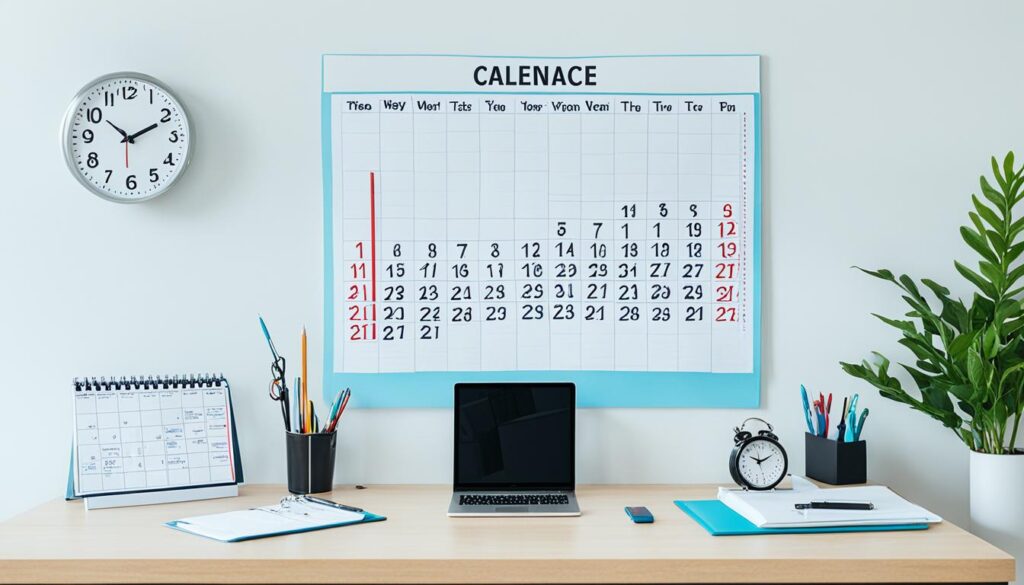Master Time Management Stress with Ease

Do you feel overwhelmed by your never-ending to-do list? Are you constantly racing against the clock, trying to keep up with deadlines and responsibilities? It’s time to take control of your time and conquer the stress that comes with it. Effective time management techniques can not only help you accomplish more but also provide stress relief strategies to improve your overall well-being. Are you ready to unlock the secrets of mastering time management stress with ease?
Key Takeaways:
- Learning to say “no” to tasks that don’t align with your goals can help manage your workload and prevent burnout.
- Prioritizing tasks, making a reasonable schedule, and mastering multitasking can contribute to stress reduction and increased productivity.
- Creating a prioritized to-do list and organizing daily tasks can help you focus on what’s truly important and maximize your efficiency.
- Setting realistic goals and planning in advance are crucial for effective time management and stress relief.
- Remember to prioritize self-care activities to maintain overall well-being and balance in your life.
Say “No” to Overwhelm
Learning to say “no” is crucial for effective time management and stress reduction. Taking on only the tasks that are important to your career or personal development allows you to focus on what truly matters and frees up your time and energy.
By setting boundaries and refusing tasks that don’t align with your goals, you can prevent overwhelm and avoid taking on too much work. This practice helps you prioritize your workload and channel your attention towards tasks that bring progress in various areas of life.
Benefits of Saying “No”
When you embrace the power of saying “no,” you unlock a multitude of benefits:
- Reduced stress levels: By deliberately choosing to tackle only the essential tasks, you eliminate unnecessary pressure and overwhelm, leading to a more peaceful and focused mindset.
- Increased productivity: By allocating your time and energy solely on tasks that align with your goals and priorities, you can dedicate more concentrated effort and attention, ultimately achieving greater productivity and efficiency.
- Better work-life balance: Saying “no” helps create boundaries and allows you to allocate time for your personal life, hobbies, and self-care activities. By maintaining a healthy balance between work and personal time, you can achieve greater well-being and happiness.
- Opportunities for growth: By declining tasks that don’t align with your goals, you create space for new opportunities that can contribute to your personal and professional growth. Saying “no” enables you to focus on projects and tasks that enhance your skills and bring fulfillment.
Remember, it’s important to assertively communicate your no, while still maintaining professionalism and respect for others. Use clear and polite language, explaining your priorities and workload when necessary.
By mastering the art of saying “no,” you take control of your time management and stress levels, allowing you to focus on what truly matters. Embrace the power of setting boundaries and prioritizing your tasks, and watch as your productivity and well-being soar.

| Benefits | Result |
|---|---|
| Reduced stress levels | Less overwhelm and increased focus |
| Increased productivity | Greater efficiency and accomplishment |
| Better work-life balance | Enhanced overall well-being and satisfaction |
| Opportunities for growth | Professional and personal development |
Make a Reasonable Schedule
Creating a reasonable schedule is essential for managing time and reducing stress. When you plan ahead and map out your work or class schedule, as well as other tasks like shopping, errands, and cooking, you provide structure and meaning to your day-to-day life. By being realistic about what you can accomplish and prioritizing self-care activities like exercise, you can effectively reduce stress levels and improve your overall health.
One effective stress relief strategy is to aim for 30-60 minutes of physical activity each day. Whether it’s going for a walk, practicing yoga, or hitting the gym, exercise releases endorphins, which are natural mood boosters. Additionally, exercise helps reduce cortisol, the stress hormone, and promotes better sleep, further reducing stress levels.
To better organize your time and increase productivity, develop a realistic weekly routine that takes into account your responsibilities and personal needs. By having a consistent daily schedule, you eliminate decision fatigue and allow yourself to focus on the tasks at hand.
Here’s an example of what a reasonable schedule could look like:
| Time | Activity |
|---|---|
| 6:00 AM | Wake up and exercise |
| 7:00 AM | Breakfast and personal hygiene |
| 8:00 AM | Work/Classes |
| 12:00 PM | Lunch Break |
| 1:00 PM | Work/Classes |
| 5:00 PM | Exercise or leisure activity |
| 6:00 PM | Dinner |
| 7:00 PM | Free time for personal hobbies |
| 9:00 PM | Wind down for bedtime |
By following a reasonable schedule, you can save time and energy in the long run, leading to reduced stress and improved overall well-being.

Master Multitasking
Multitasking can be a game-changer when it comes to time management and reducing stress. By combining tasks and errands, you can optimize your precious time and accomplish multiple to-dos with ease. Imagine cooking extra portions of a meal to save you from having to prepare food again in the future. It’s a small time-saving hack that adds up over time. Similarly, planning out your errands and bundling them into one trip can help you maximize efficiency and minimize time-consuming back-and-forths.
The key to successful multitasking is to identify opportunities to combine tasks whenever possible. It’s about finding those sweet spots where you can knock out multiple tasks simultaneously without sacrificing quality. By mastering multitasking techniques, you can reclaim precious hours of your day and allocate them to other productive or leisurely activities. The result? Reduced stress and a greater sense of accomplishment.

Remember: Not all tasks are suitable for multitasking, especially those that require your full attention or concentration. Use discernment when deciding which tasks to combine and always prioritize quality over quantity.
Organize Your Daily Tasks
Organizing your daily tasks is a crucial skill for effective time management and stress reduction. By creating a prioritized to-do list at the beginning of each day, you can ensure that you focus on the tasks that matter the most, helping you stay on track and accomplish your goals.
To create an organized to-do list, consider using numerical values or color coding to visually prioritize your tasks. For example, highlighting urgent tasks in red and less important tasks in green can help you easily identify your priorities. By visually organizing your tasks, you can reduce decision-making stress and maintain clarity throughout the day.
Remember to prioritize and complete your tasks based on their importance, not just their urgency. This approach allows you to allocate your time and energy to tasks that align with your long-term goals, ultimately reducing stress and increasing productivity.
Additionally, adding notes or subtasks to each item on your to-do list can help you outline key actions or provide details needed for completion. By breaking down larger tasks into smaller, manageable steps, you can overcome overwhelm and steadily make progress towards your goals.
To further optimize your task organization, consider utilizing digital tools or apps that allow you to create and manage your to-do lists. These tools often offer features such as reminders, due dates, and the ability to collaborate with others, enhancing your productivity and reducing stress.
By organizing your daily tasks effectively, you can maximize your productivity, reduce stress, and maintain a sense of control over your time.

Example of a Prioritized To-Do List:
| Priority | Task | Notes |
|---|---|---|
| 1 | Prepare presentation for client meeting | Include key data and visuals |
| 2 | Reply to urgent emails | Address client inquiries first |
| 3 | Complete financial report | Ensure accuracy and double-check calculations |
| 4 | Attend team meeting | Prepare talking points and updates |
| 5 | Follow up with potential leads | Include personalized messages |
Conclusion
Managing your time effectively is crucial for reducing stress levels and increasing productivity. By implementing a few key strategies, you can overcome time management stress and embrace a more efficient and fulfilling way of life.
First, learn to say “no” to tasks that don’t align with your goals. By setting boundaries and prioritizing tasks that truly matter to your career and personal development, you can prevent overwhelm and focus on what brings progress in various areas of your life.
Next, make a reasonable schedule. Plan ahead and map out your day-to-day tasks, including work or class schedules, shopping, errands, and self-care activities. Being realistic about what you can accomplish and prioritizing self-care, like exercise, will save you time and energy in the long run.
Mastering multitasking is another valuable technique. Look for opportunities to combine tasks and errands, such as cooking extra portions of a meal or planning out errands in one trip. By making the most of your time, you can free up more time for other productive or leisure activities, ultimately reducing stress.
Finally, organize your daily tasks into a prioritized to-do list. Creating a list at the beginning of each day and identifying the most important tasks allows you to focus on what matters most. Use numerical values or color coding to visually prioritize tasks, and add notes to outline key actions or details needed for completion.
Remember, effective time management is not just about getting tasks done; it’s about creating a more balanced and productive lifestyle. By prioritizing tasks, setting achievable goals, and planning in advance, you can reduce stress, increase productivity, and maintain overall well-being. Take care of yourself and prioritize self-care activities to ensure a more fulfilling and successful life.






